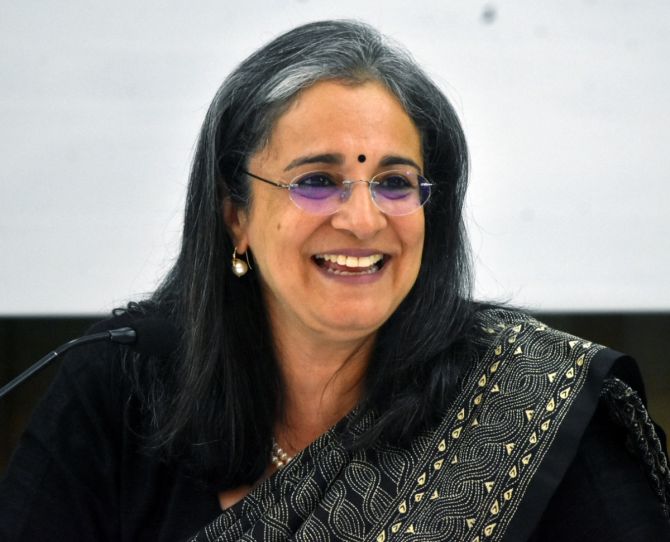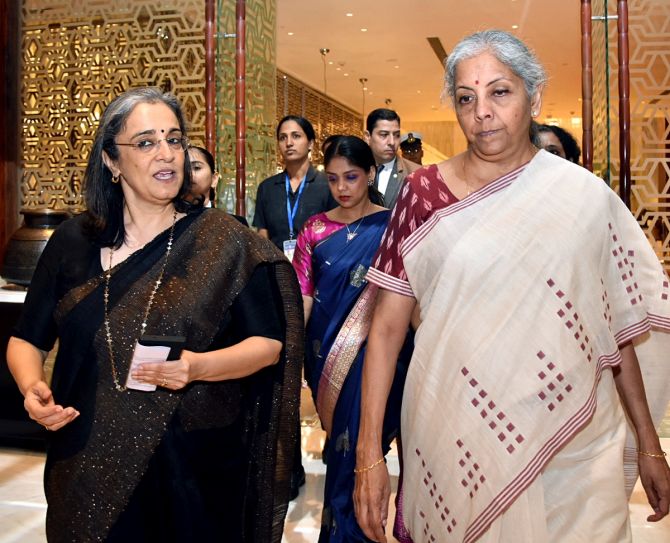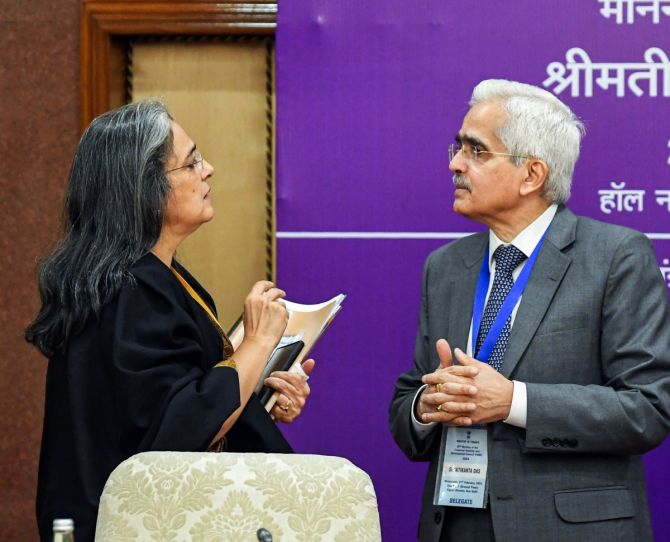Madhabi Puri Buch, the first female chairperson of Sebi, doesn't plan to rest on her laurels in her third and final year in office and has set out an ambitious goal, such as moving towards a same-day and instantaneous settlement cycle for the secondary market..

Madhabi Puri Buch's first year as chief of the Securities and Exchange Board (Sebi) was underscored by speedy reforms.
During the second year of her initial three-year tenure, Buch pivoted towards a more balanced approach -- placing more emphasis on consensus-building even as the reform process slowed.
The changed approach was evident as Sebi put nearly half a dozen key proposals on the backburner, set up an Industry Standards Forum for policy implementation, and delayed the implementation of the new disclosure around verification of market reforms.
Among the reforms in cold storage are the total expense ratio framework for the mutual fund industry, redefining unpublished price-sensitive information, norms around suspicious trading activity, and an overhaul of delisting norms.
Despite initial resistance from the industry, Buch, the first female chairperson of Sebi, managed to halve the settlement cycle both for the secondary markets (to T+1) as well as the initial public offering market (to T+3). For this, the former banker earned a lot of accolades and also improved India's standing among global peers.
The 58-year-old -- who oversees India's $4.7 trillion equities market -- doesn't plan to rest on her laurels and has set out an ambitious goal, such as moving towards a same-day and instantaneous settlement cycle for the secondary market.

Sebi is also giving the final touches to a new payment system for settling trades where funds will remain in the investor's bank account, thereby preventing misuse by brokers.
During Buch's second year, Sebi also introduced repo clearing and a backstop facility to help the debt segment.
The regulator also beefed up the vetting process for IPOs and upped its ante against errant finfluencers and television experts manipulating stocks.
However, a proposal to restrict associations with finfluencers is yet to be approved.
The year was also not short of challenges as Sebi faced some setbacks before the Securities Appellate Tribunal (SAT) in matters such as the National Stock Exchange colocation case (the tribunal set aside the penalty imposed by Sebi), lenders' appeal for pledged shares in Karvy matter (Sebi's order was called a ‘highway robbery' by SAT), and Zee Entertainment Enterprises (the tribunal lifted the ban on Punit Goenka).
The market regulator also had to deploy huge resources to investigate allegations against Adani Group levelled by US-based Hindenburg Research.
The Adani matter also led to further tightening of foreign portfolio investor disclosure norms by the regulator.
In her final year, Buch will look to implement key reforms like instant delivery of trades, ensuring she leaves a rich legacy behind.
Also, Sebi's possible orders in the Adani and Zee matter would be keenly watched by market players.

THE CHANGEMAKER
Key reforms
- Successful implementation of the T+1 settlement and T+3 cycle for the IPO market
- More engagement with the industry in smoothing out policy-making and implementation
- Investor-friendly reforms for the AIF industry around fees, benchmarking, and valuation norms
- Backstop facility for the debt MFs, AMC Repo Clearing to boost volumes in the segment
- Block mechanism for the secondary market, upstreaming of client money by brokers
- Faster approvals, a focus on corporate governance, and tightening of primary market scrutiny
- The first social stock exchange listing opening new avenues for raising money by non-profits
- Filling the gaps in the FPI disclosure regime
Challenges
- Unfavourable orders by SAT in Zee Entertainment, NSE colocation case, share pledging matter in Karvy case
- Delay in key reforms such as bringing MFs within the insider trading ambit, rumour verification
- Ensure the development of AIFs while at the same time ensuring no circumvention of regulations
Road ahead
- Implementation of instantaneous and same-day settlement for secondary market trades
- Building consensus among all stakeholders on key reforms
- Clipping the wings of finfluencers, those spreading misinformation
- Use of AI and other advanced tech
Feature Presentation: Rajesh Alva/Rediff.com












 © 2025
© 2025